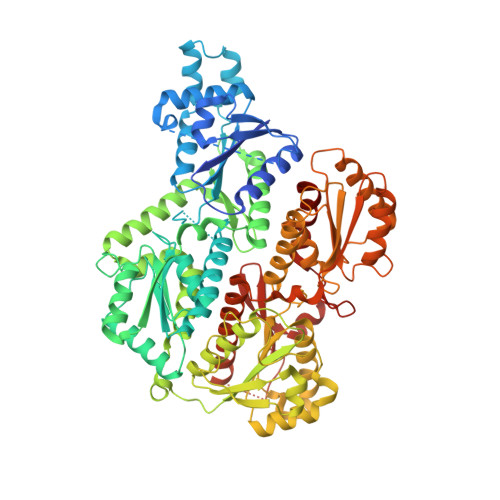Crystal structure of human platelet phosphofructokinase-1 locked in an activated conformation.
Kloos, M., Bruser, A., Kirchberger, J., Schoneberg, T., Strater, N.(2015) Biochem J 469: 421-432
- PubMed: 26205495
- DOI: https://doi.org/10.1042/BJ20150251
- Primary Citation of Related Structures:
4RH3, 4U1R, 4WL0, 4XZ2 - PubMed Abstract:
Phosphofructokinase-1 (Pfk) acts as the main control point of flux through glycolysis. It is involved in complex allosteric regulation and Pfk mutations have been linked to cancer development. Whereas the 3D structure and structural basis of allosteric regulation of prokaryotic Pfk has been studied in great detail, our knowledge about the molecular basis of the allosteric behaviour of the more complex mammalian Pfk is still very limited. To characterize the structural basis of allosteric regulation, the subunit interfaces and the functional consequences of modifications in Tarui's disease and cancer, we analysed the physiological homotetramer of human platelet Pfk at up to 2.67 Å resolution in two crystal forms. The crystallized enzyme is permanently activated by a deletion of the 22 C-terminal residues. Complex structures with ADP and fructose-6-phosphate (F6P) and with ATP suggest a role of three aspartates in the deprotonation of the OH-nucleophile of F6P and in the co-ordination of the catalytic magnesium ion. Changes at the dimer interface, including an asymmetry observed in both crystal forms, are the primary mechanism of allosteric regulation of Pfk by influencing the F6P-binding site. Whereas the nature of this conformational switch appears to be largely conserved in bacterial, yeast and mammalian Pfk, initiation of these changes differs significantly in eukaryotic Pfk.
Organizational Affiliation:
Institute of Bioanalytical Chemistry, Center for Biotechnology and Biomedicine, University of Leipzig, Deutscher Platz 5, 04103 Leipzig, Germany.















